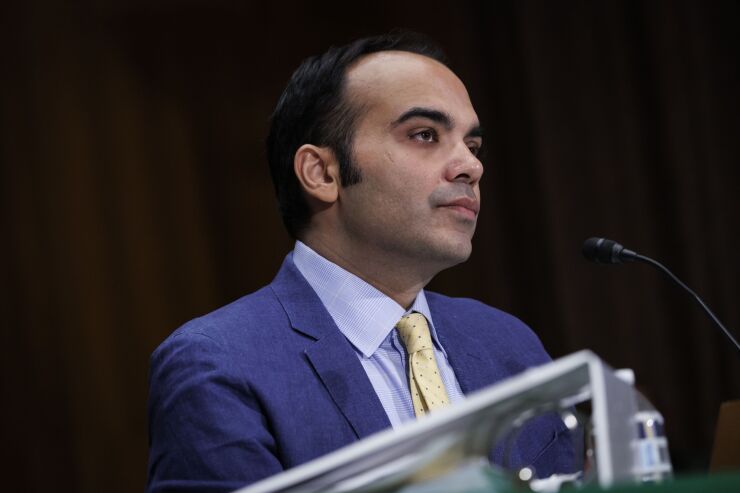Hundreds of small community banks and credit unions are claiming they will suffer economic harm if a plan by the Consumer Financial Protection Bureau to cut credit card late fees to $8 goes into effect next year.
The CFPB wants to eliminate $9 billion a year in the annual revenue of credit card issuers by slashing credit card late fees to $8, from $30 for a first late fee and $41 for subsequent late payments. But banks and credit unions are crying foul, saying they will be forced to sue the CFPB for failing to convene a small-business review panel before issuing its plan this week. For any major regulatory change that causes an economic impact of $100 million or more on small businesses, the CFPB is required to convene a panel of small entities.
"The Dodd-Frank Act requires them to do a SBREFA panel for all their major rulemakings," said Greg Mesack, a lobbyist with the National Association of Federally-Insured Credit Unions. He used the abbreviation for the Small Business Regulatory Fairness Act that requires extra work be performed with input from small entities.

In response, Chopra — to the surprise of many experts — instead certified
Many expect the issue will ultimately be decided in court.
"The CFPB may have made a big mistake by not doing a small-business review panel," said Ed Groshans, senior policy and research analyst at Compass Point Research & Trading. "It's clear this rule will impact these small businesses and it's very clear that the CFPB is going to be sued. This may be a big setback."
Input from small businesses is supposed to happen during the pre-proposal stage, before an agency has decided on a specific regulatory approach, bank and credit union trade groups said. The American Bankers Association, Consumer Bankers Association, Independent Community Bankers of America and NAFCU
Financial institutions have 60 days to comment on the CFPB's proposal, which is expected to be finalized next year. The timeline is relevant because a final rule would first have to be published in the Federal Register before a company or trade group could file suit.
More than half of banks that issue credit cards — 451 institutions in all — are considered small entities with assets of $850 million or less, as defined by the Small Business Administration. Among credit unions, 85%, or 2,670 entities that issue credit cards, also qualify as small businesses.

The CFPB is one of just three agencies — including the Occupational Safety and Health Administration and the Environmental Protection Agency — that must determine the small-business impact of major rules. The bureau also is required to identify small entities by working with the SBA's Office of Advocacy as well as the Office of Information and Regulatory Affairs.
A core issue in the upcoming fight over late fees involves what data is being collected on card issuers' costs and losses associated with late payments. The Fed data cited in the CFPB's plan is skewed to large banks and does not include data from banks with under $100 billion of assets. The data also cannot be made available to the public through a Freedom of Information Act request, analysts said.
Chopra has further antagonized the credit card industry by claiming that late fees are a profit center for banks.
"Historically, credit card companies charged relatively small penalty amounts for missed payments. But once they discovered that these fees could be a source of easy profits, late fees shot up, with a surge occurring in the 2000s," Chopra told reporters on Feb. 1. "By our estimates, 75% of late fees — $9 billion — have no purpose beyond padding the credit card companies' profits.
The bureau's plan to cut late fees was more aggressive than
"I think there is a greater chance of this [proposed rule] going into effect than what the market is suggesting right now," said Ed Mills, managing director at Raymond James and a former senior policy advisor to the Senate Banking Committee. "This is really the one rule that has the greatest chance of being finalized."
Many banks, credit card companies and investors say the CFPB will be declared unconstitutional by the Supreme Court in the next year, after an
Chopra
"There is an overconfidence that the industry will win and Chopra will lose," continued Mills. "I can't find an investor who thinks this proposed rule is actually going to go into effect, but I have a very different opinion. You don't get a press release from the White House in putting out a rule unless you're pretty sure you're going to get this done."





